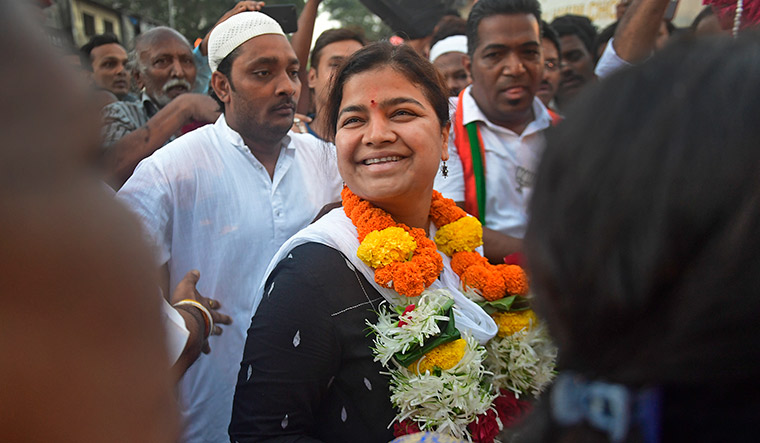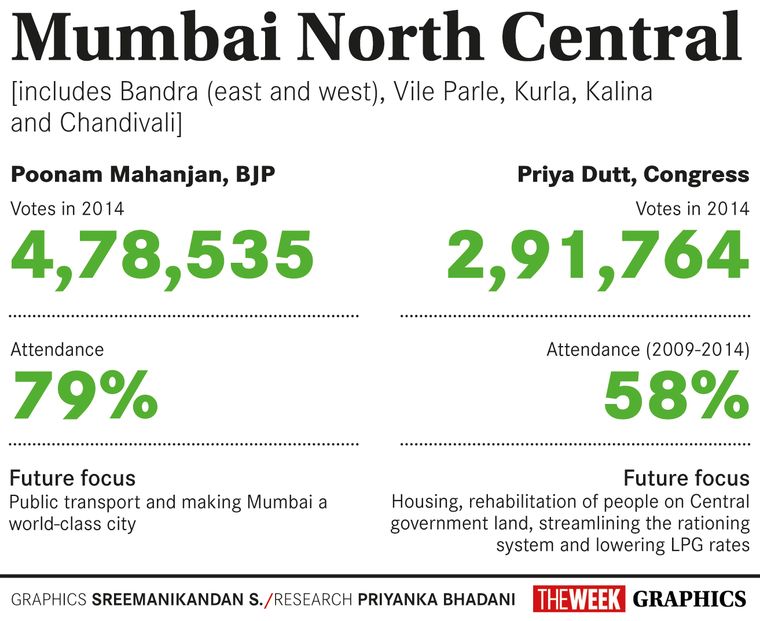It is posh; it is poor. With high-rises and bungalows on one end and slums on the other, the differences are stark in Mumbai North Central constituency. The two prime candidates—BJP’s Poonam Mahajan and Congress’s Priya Dutt—have a few similarities though. Both their fathers, Pramod Mahajan and Sunil Dutt, were former MPs. Also, Poonam and Priya are seeking a second chance to serve the constituency—while Poonam is the current MP, Priya won the seat in the 2009 Lok Sabha elections (before that, she represented the Mumbai North West constituency following her father’s death in 2005).
Poonam’s first floor office in Santacruz is teeming with people, many with a list of problems in their area and others with requests to join the party. A bunch of people surround her in the cabin, too. She is sweetly reassuring a woman, who is here with her young son. Poonam turns to the boy and asks, “Chocolate khaya (Did you eat the chocolate)?” Surprised, the boy replies: “I didn’t get any chocolate.” Poonam, a tad upset, asks her assistants to get chocolates for the boy. Two assistants get two bars each, and Poonam hands them to the boy and hugs him. “Happy?” she asks. He grins.
In contrast to Poonam’s office, Priya’s is not as busy. There is a lot of movement, but people’s affection for her is on display only when she steps out. People gather around her car during her campaigns and want her to visit their side of the locality. At Kherwadi in Bandra (east), after her scheduled ten-minute stop, she is requested to garland a statue of B.R. Ambedkar nearby. She agrees and walks towards it as the crowd follows. Getting back into the car is not so easy though. Many from the crowd want to shake hands, some want to invite her to other nearby areas, and some complain of shortage of water and lack of toilets. As she gets into the car, she agrees to every offer and assures to take care of every problem.
The day we met, the Congress had unveiled its manifesto. “Ours (the manifesto) is a breath of fresh air,” she says. “It is really a people’s manifesto. It is what they want, as opposed to bulldozing [one’s] way through. That in itself is a huge difference,” she says, talking about the ideology of the two leading parties.
Priya had announced a break from electoral politics, mainly to be with her two sons and to focus more on her Nargis Dutt Foundation. Her comeback, therefore, was a surprise. Congress president Rahul Gandhi reportedly asked her to reconsider her decision to not contest polls. “I also realised there was a lot happening in the country, which is not something we want to leave behind for our children,” she says. “The biggest issue is our freedom of speech, or our freedom in every way.” She takes out her phone and shows me a WhatsApp forward of a school textbook that has campaign material with Prime Minister Narendra Modi’s photo, another is a pamphlet with his photo that was distributed in schools. “It is basically our democracy that is being attacked at every level. And, also our Constitution,” she says. She realised that like-minded people, who believe in secularism and an united India, had to make a difference. “I realised if this is my way, coming in [again] and fighting an election, I would have to do that. That is one of the very big reasons to fight this election,” she says. “I want my children to grow up in a country and see peace and harmony, happiness and love.... I know it is being too utopian.”
Poonam and Priya were pitted against each other in the 2014 Lok Sabha elections, too. While Priya was already a two-time MP then, Poonam was making her electoral debut. Poonam rode to victory on the Modi wave, winning with a margin of 1.86 lakh votes. Poonam garnered 56.6 per cent of the total 8.45 lakh votes, whereas Priya managed only 34.51 per cent. Candidates from other parties like the Aam Aadmi Party, the Bahujan Samaj Party and the Samajwadi Party had almost negligible votes.
This time, the Vanchit Bahujan Aghadi, in alliance with Asaduddin Owaisi’s All India Majlis-e-Ittehadul Muslimeen, has nominated Dr A.R. Anjaria, famous for his anti-terrorism campaigns. Anjaria hopes to win by a wide majority as the constituency has a considerable Muslim population. “These so-called secular parties only need our votes. They do not want to give us representation,” he was quoted in newspapers. Social activist Mayank Gandhi, a resident of Vile Parle East, however, begs to differ. “It is not a fight for religious representation, but for the restoration of civic and policy issues,” he says, adding that the last term was in good hands.
Before Poonam came in, Mumbai North Central was a Congress bastion. “This was a Congress fortress. That is what they used to call it,” she says, with amusement. “The BJP fought in 2009 and garnered a good amount of votes, but we did not win (BJP’s Mahesh Ram Jethmalani won 1.44 lakh votes and Priya 3.19 lakh votes then).” Poonam says that post the 2014 Lok Sabha polls, the BJP’s vote share has only been increasing, be it in the 2014 Vidhan Sabha elections or during the 2017 Mumbai civic polls. “Today, along with our alliance partners, we have that kind of connect with people. The scenario has completely changed from 2014. We have much more power, much more strength, and more people supporting us,” she says.
Among her constituents, Priya is mostly remembered for being approachable, accessible and kind-hearted. But, Priya says, people remember her work, too. “Right now, they would have a comparison also on the basis of what has been done and what has not been done,” she says. “People will remember the work that has affected them personally. Otherwise, they may forget.” She cites her role in initiating the Milan flyover in Santacruz. “I can understand that people may not remember that, but the people who were rehabilitated during that time will definitely remember what I did. That affected their lives,” she says. “The Kurla Terminus was developed during my tenure, for which we raised funds from the railways. People would not remember who did it, but people will remember things like, ‘She came in when there was no water in our area’ or ‘There was no toilet in our area, she built that’. We have done a lot of that.”
Poonam, however, says that she saw discrepancies in policy issues during her 2014 campaign. Take, for instance the open defecation free campaign, she says. “Whichever place I went to, people told me, ‘Didi, ek achcha toilet bana ke do (Please build a good toilet)’. And, I got that demand from 500 different places. Each and every ward was asking me about it. I am now known as the toilet MP,” she says, boasting of the 1,428 toilets that she has built. She says she ensured the toilets were kept clean through the “public-politician partnership” model.
Social activist Lillian Pais, however, disagrees. “We did not have garbage dumps and too many toilets earlier. Now, even if they exist, their maintenance is a huge problem,” says the Bandra resident. Only 30 per cent of the population here contributes to keep the surroundings and toilets clean; the rest, residing in the slums, do not, says Lillian. “Who is policing it?” she asks. “It is not happening at the municipality level nor at the state level. There is no proposal for it. We continue to live around trash.” Also, development is an eyewash, says Farida Khanzada, a Vile Parle resident. “Roads are bad. Repair work is carried out only near election time,” she says. “Both the Ps [Poonam and Priya] are the same.”
But, these issues, says Gordon D’Souza of Citizens For Good Governance, Vile Parle, are to be addressed during civic polls. He wants this poll narrative to be shifted from a battle of ideologies to who would better utilise the MP funds. And so, he and other members from his community are trying to organise talks with both the leading candidates in his area. “The MPs have Rs 2 crore in the Member of Parliament Local Area Development Scheme and we want to know what they plan to do with that,” he says. “The benefits have to come to the cross section of citizens. We want to make an informed choice based on that.”




